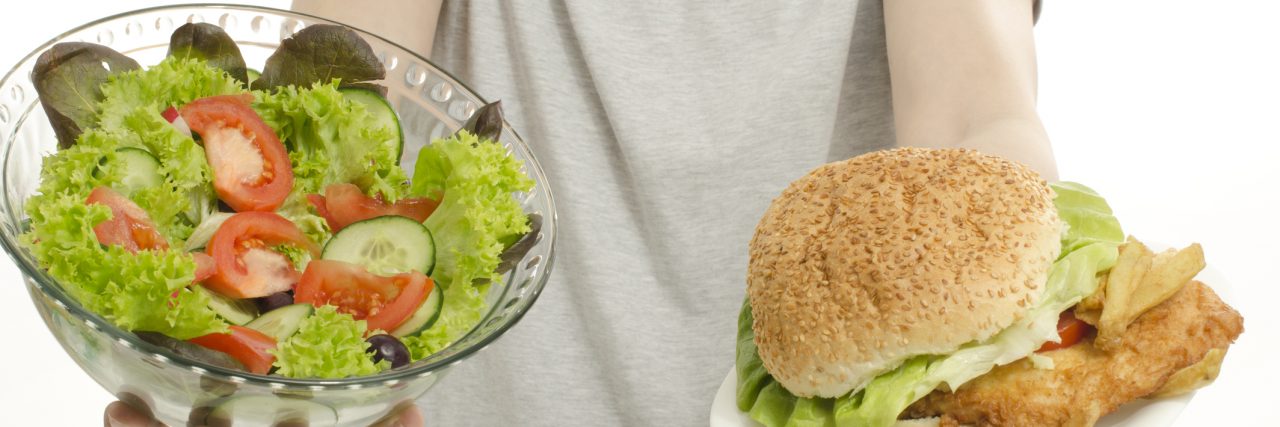We have such strict narratives about food. There is good, there is bad. There is healthy, there is unhealthy. Allowed, not allowed. Clean, dirty. Fattening, bad for the waistline, cheat meals. This is how we talk about food. The question is why?
Food isn’t good or bad; it doesn’t have a moral compass. There are foods that are good for your body and foods that are good for your soul — you need both. You need nutrients and vitamins from your fruits and veggies and chia seeds but you also need pizza and cake. You can have it all. Who’s to say you can’t be healthy and still eat pasta? What makes dessert the enemy?
It doesn’t have to be. For me, before anorexia, there was orthorexia. It’s a form of disordered eating focused on “clean” eating. Does that mean washing your vegetables really well or something? The idea of clean eating is about not eating processed foods. There’s nothing wrong with that. Sure, if that makes you happy, then 100% do it. Do what’s good for you body and for you mind and soul. If you’re like me and eating clean stresses you out, makes you feel like food is scary, or makes you feel like a bad person for eating a cookie, maybe it’s time to reconsider. Health includes your mind; that’s why it’s called mental health. Food is not the enemy. It’s a source of life.
What makes a food good or bad? All foods are good foods, but if we’re really keen on grouping them, instead of good or bad consider: good for body or good for mind.
Broccoli, quinoa, carrots, chicken, apples, grapes, oats — these are good for your body.
Cake, cookies, muffins, pizza, fries — these are good for your mind. You can eat all these things in moderation. Sure, you probably shouldn’t eat fries for every meal of every day, but who’s to say you can’t eat them whenever the mood strikes? Food shouldn’t be restrictive or disciplined to the point where you feel anxious because of it. Both groups of food have their place in your diet.
Each time I would try to restrict myself by not eating sugar, not eating wheat, not eating dairy, whatever, I would feel panicked and stressed. I would worry I was headed back to anorexia, and the thing is, the second I started restricting my foods, all of the eating disorder patterns flooded right back in. The voice in the back of my head was back instantly. Then I would fight it, do the opposite, and binge on chips and cookies and pop. Then I would panic about eating those foods, and the cycle would start again.
When I started eating foods when I wanted to, not when my eating disorder said I had to, I felt so relieved. It means I can eat cake at my cousin’s birthday and the world won’t end. I can go on to eat “normally” the next day. I can eat my veggies when I’m craving them and have good fruit, nuts, seeds, and grains. I can — and frequently do — also stop for fries when a craving strikes me. It is balanced.
Food also isn’t something you have to earn. It’s a right. It’s a necessity. You don’t have to go to the gym to deserve a cookie. You can have a cookie, then sit right down on the couch. You don’t have to make up for it by eating less for the next few days. You don’t have to work for it. Work out because you enjoy it, not because you have to after what you ate. You don’t have to punish yourself for “cheating.”
Food doesn’t scare me anymore. It used to. It used to scare me more than absolutely anything on this planet. Without my ED I can see food for what it is. Food isn’t evil or bad or fattening or terrifying. Food is just food. It has no power over you. Frame your thinking differently. Don’t let the narrative of good and bad, healthy and unhealthy, clean and dirty, run your life. Don’t let food take away your happiness, don’t let food make you feel like you’re missing out. Enjoy it, savor it. The same goes for life. Taste the cake, eat the pizza, take the cookie. It will not hurt you, I promise. Have your carrots and quinoa and chicken, too. Have it all.
If you or someone you know is struggling with an eating disorder, you can call the National Eating Disorders Association Helpline at 1-800-931-2237.
We want to hear your story. Become a Mighty contributor here.
Thinkstock photo by iulianvalentin

